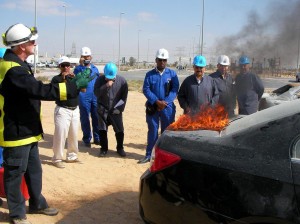
By burning vehicles, fire patterns are studied, which leads in turn to identifying the cause.
The Great Recession continues to have interesting side effects on the automobile business. In the United Arab Emirates if you’re a guest worker and lose your job unless you find another — now non-existent — one you become an illegal immigrant. You then have 30 days to get out of the country. If you’re in debt and don’t pay it off, you face debtors’ prison if caught. This has created another source of, ahem, used cars as thousands of former workers – they make up almost 90% of the population – are now fleeing as jobs evaporate. More than 1000 visas are being canceled every day. Local newspapers say that there are thousands upon thousands of abandoned cars at the Dubai airport as a result.
One growth area may be Mohammed “the torch” helping people fight the recession, though arson statistics are hard to come by since the government isn’t exactly transparent. Worse, it takes a dim view of media even talking about such things and is considering levying hundreds of thousands of dollars of fines on reporters who hurt the country’s reputation during the current crisis, which could lead of course to debtor’s prison. Think any self-censoring by reporters is going on?
“We look forward to a new law that eliminates the long list of bans in the media law that was issued in 1980, and allows freedom to publish newspapers and other publications. The fact that one needs a license to publish a newspaper means there is no freedom and media is being controlled by the government,” said Abdul Hamid Ahmad, Editor-in-Chief of Gulf News.
UAE prime minister Sheik Mohammad bin Rashid al-Maktoumm said more than a year ago that he favors a new press law, but when this will occur and what will be in it is unclear.
It is then, perhaps, just a coincidence that General Motors recently held training in vehicle fire investigation. The sessions, said to be the first to be offered by any car manufacturer, were run in Dubai during February and March in conjunction with regional Police and Civil Defense authorities. The GM Middle East Technical Assistance Centre (TAC) invited 20 participants from the Dubai Police, Abu Dhabi Police, Kuwait Civil Defense, Qatar Police, Kingdom of Bahrain Police and the Sultanate of Oman Civil Defense to “help them enhance their investigation techniques in cases of burned-out vehicles.”
Both theoretical and practical demonstrations were included, as well as report writing, and examining and preserving the evidence of a fire scene. The theory sessions took place in the GM Training Center in Dubai. Practical sessions were at the Al Ruwiyah Dubai Police Training site. By burning vehicles, fire patterns were studied so one could understand where the fire originated from, which in turn leads to identifying the cause.
GM vehicles have been sold in the Middle East since the 1920s. Currently available models include Cadillac, Chevrolet, GMC, Hummer and Saab. In 2008, GM sold 144, 485 vehicles in the Middle East, a 6% increase over 2007. We’ll see how things go in 2009.
“It is great that GM can support the local police and civil defense in such an important area. This is our way of showing our partnership,” said Ali Hamad, Technical Support consultant at General Motors Middle East Operations. “The feedback received was very positive and everybody agreed that the training provided was very useful and not seen before in the vehicle fire investigation field.”
The training was conducted by Salamander Fire Australia Pty Ltd., a company recognized and accredited by the Australian government. The instructors, all members of the International Association of Arson Investigators and the Victorian Association of Fire Investigators, are — immigrant workers themselves. At least they still have jobs.
